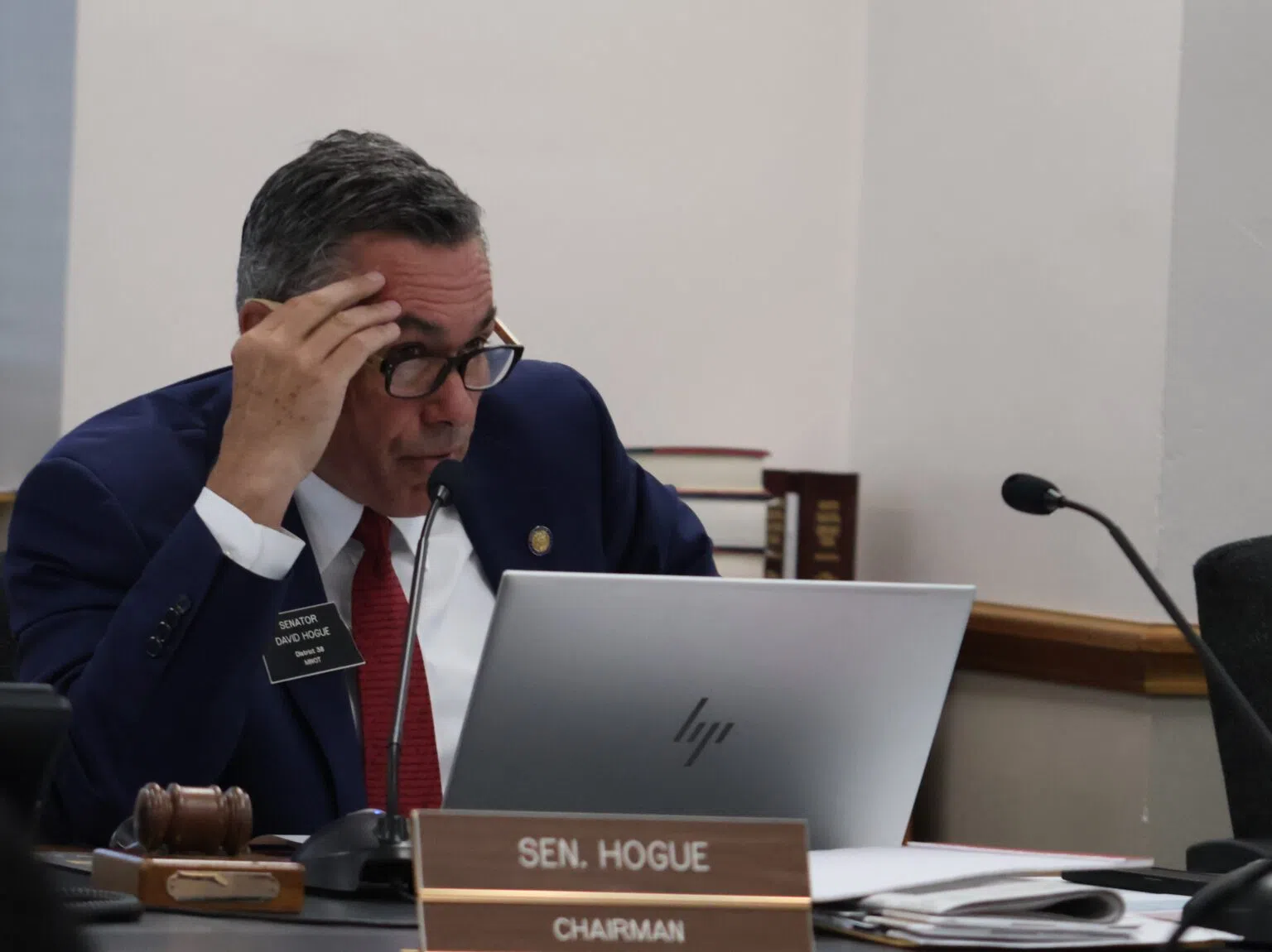
Senate Majority Leader David Hogue, chair of Legislative Management, speaks during a July 11, 2025, meeting to discuss how the Legislature should respond to a veto by Gov. Kelly Armstrong. (Mary Steurer/North Dakota Monitor)
BISMARCK (North Dakota Monitor) — North Dakota lawmakers are unlikely to take the executive branch to court over a disagreement over the governor’s veto power, Legislative Management members indicated Friday.
The dispute arose in May, after the legislative session, when Gov. Kelly Armstrong’s office accidentally appeared to line-item veto $35 million in housing funding.
Armstrong had intended to veto $150,000 the 2025 Legislature set aside for a Native American homelessness liaison, but a staff member mistakenly also crossed out $25 million for affordable housing and $10 million for homelessness in a markup of the bill.
The Attorney General’s Office last month issued an opinion finding that the inadvertent markup was not an issue because Armstrong had been sufficiently clear about what he intended to veto in his memo, and so the Legislature need not take further action.
Legislative Council, in its own analysis, disagreed. Attorneys argued Wrigley’s opinion conflicts with previous rulings by the North Dakota Supreme Court, the constitution and a prior attorney general’s opinion and said the Legislature could consider holding a special session and override the veto to free up the $34.85 million.
Regardless, the Office of Management and Budget already allocated the money. The agency in an email earlier this week confirmed it dispersed the $34.85 million to the Housing Finance Agency on July 1.
But lawmakers indicated Friday that their concerns go beyond just money.
Even if the veto is overridden in a special session, the attorney general’s opinion would still stand. Both Legislative Council and lawmakers said the opinion could give the executive branch too much power over how vetoes they consider ambiguous are interpreted in the future.
“I guess the question is that, if we did a special session to override the veto, it’s just a Band-Aid. It isn’t addressing the concerns of, ‘What is a veto and what isn’t?’” said Sen. Ronald Sorvaag, R-Fargo.
Legislative Council Director John Bjornson said if the Legislature wants more clarity on the governor’s veto authority, it has two main options: it could ask the North Dakota Supreme Court to weigh in by moving forward with a lawsuit, or it could amend the underlying law.
Members of Legislative Management on Friday seemed more apt to do the latter.
Senate Minority Leader Kathy Hogan, D-Fargo, said a legal challenge could leave the millions of dollars for housing and combating homelessness tied up while the lawsuit plays out.
“I think the risk of jeopardizing the money that’s actually providing service to people is so great that I don’t think we should seek the Supreme Court ruling at this point,” Hogan said during the meeting.
Legislative Management voted to direct the Legislative Procedures and Arrangements Committee to come up with a plan to study how the Legislature and executive branch can clarify the process for vetoes, including those issued after the session adjourns. The committee also was asked to analyze the attorney general’s opinion. Legislative Procedures and Arrangements will meet and report back to Legislative Management within 90 days with their first steps, lawmakers said Friday.
“This may take a little work,” Sen. Jerry Klein, R-Fessenden, chair of the Legislative Procedures and Arrangements Committee, said during the meeting.
The Legislature could prepare a bill for consideration during the 2027 legislative session. Or, if lawmakers convene for a special session before that, they could vote on the legislation at that time.
The meeting agenda included a closed-door executive session, but the committee held its entire discussion in an open meeting.
Wrigley after the meeting said he had no issue with the prospect of lawmakers amending the law to make veto procedures more specific, but cautioned them to make sure the policy respects the veto authority granted to the governor under the constitution.
Redistricting lawsuit
Lawmakers on Friday also discussed how a pending voting rights lawsuit against North Dakota could affect legislators representing districts 9 and 15. The plaintiffs — the Spirit Lake Nation, Turtle Mountain Band of Chippewa and three Indigenous North Dakotans — are gearing up to ask the U.S. Supreme Court to review the case after receiving an unfavorable ruling from the 8th Circuit Court of Appeals.
The group filed the lawsuit in 2022, arguing that a 2021 redistricting plan was discriminatory because it diluted the power of Native voters.
The 8th Circuit’s judgment, expected to be filed sometime next week, is likely to change North Dakota’s district map back to the version legislators approved in 2021. This would result in three lawmakers no longer living in the districts they represent, which is forbidden under the state constitution.
It’s still up in the air how the Legislature would respond to such a situation, lawmakers and Legislative Council staff said Friday. Members could allow their peers to serve out the remainder of their terms or vote to remove them from office.
The three affected lawmakers would be Rep. Collette Brown, D-Warwick, who would go from representing District 9 to District 15; Rep. Donna Henderson, R-Calvin, who would switch from District 15 to District 9B; and Sen. Kent Weston, R-Sarles, who would switch from District 15 to District 9.
Sen. Janne Myrdal, R-Edinburg, celebrated the 8th Circuit’s decision and indicated she would support having affected members removed and replaced with people who reside in the amended districts.
“As sad as it might be for some of our colleagues in those districts, I think we have a constitutional duty,” Myrdal said.
Rep. LaurieBeth Hager, D-Fargo, said that the committee should be mindful of how such a decision would affect their colleagues.
“This is their job, their livelihood, their benefit plan,” she said.




Comments